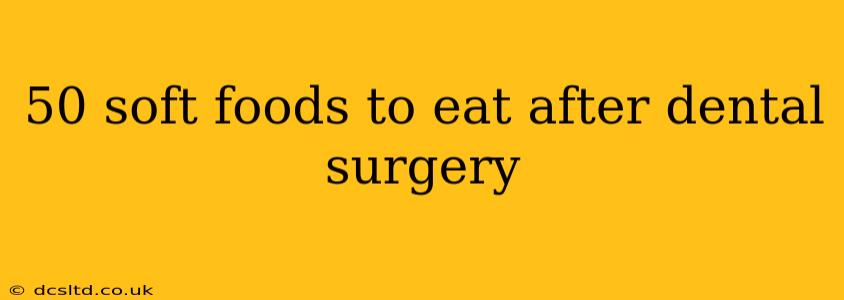Dental surgery, whether it's a simple extraction or a more complex procedure, can leave your mouth feeling tender and sore. Eating the right foods during your recovery is crucial for healing and overall comfort. This comprehensive guide provides 50 soft food ideas to nourish your body while protecting your healing mouth. We'll cover various food groups and textures, ensuring you have plenty of delicious and nutritious options to choose from.
Understanding Your Dietary Needs Post-Surgery
After dental surgery, it's vital to avoid anything that could irritate or dislodge the blood clot forming at the extraction site. This means steering clear of hard, crunchy, or acidic foods. Opting for soft, lukewarm foods will minimize discomfort and promote healing. Remember to chew gently and avoid using the surgical site for chewing.
Breakfast Options:
- Oatmeal: Creamy and easily digestible.
- Yogurt (plain or flavored): High in protein and probiotics.
- Scrambled eggs: Cooked until very soft.
- Smoothies: Blend fruits, vegetables, and yogurt for a nutritious and easy-to-consume meal. (Avoid straws)
- Mashed banana: Potassium-rich and naturally sweet.
- Applesauce: A classic soft food choice.
- Soft cooked grits: Creamy and soothing.
- Cream of Wheat: A gentle option for sensitive mouths.
- French toast (soaked thoroughly): Ensure it’s exceptionally soft.
- Pancakes (very soft): Choose a recipe that results in a tender pancake.
Lunch & Dinner Ideas:
- Soup (broth-based): Chicken noodle, vegetable, or tomato. Avoid chunky soups.
- Mashed potatoes: A comfort food staple.
- Sweet potatoes (mashed): Nutrient-rich and easy to swallow.
- Macaroni and cheese: A classic comfort food. Make sure the pasta is well-cooked.
- Pureed vegetables: Carrots, peas, or butternut squash.
- Scrambled tofu: A vegetarian option packed with protein.
- Lentil soup (pureed): A hearty and nutritious option.
- Pasta with creamy sauce (well-cooked pasta): Avoid tomato-based sauces initially.
- Salmon (flaked): A great source of omega-3 fatty acids. Ensure it's cooked until very tender.
- Chicken breast (shredded or pureed): A high-protein option.
- Ground beef (very well-cooked and soft): Can be used in soft tacos or added to soups.
- Cottage cheese: High in protein and calcium.
Snacks:
- Pudding: A creamy and comforting snack.
- Yogurt parfait: Layer yogurt with granola (crushed very finely) and fruit.
- Ice cream (full-fat): Avoid extremely cold ice cream initially.
- Milkshakes: A refreshing and nutritious option.
- Custard: A rich and creamy dessert.
- Jell-O: A simple and refreshing option.
- Refried beans: Soft and easy to swallow.
- Avocado: Rich in healthy fats.
- Banana nice cream: Frozen bananas blended into a creamy dessert.
- Peaches (canned or very ripe): Soft and sweet.
- Pea puree: A simple and nutritious snack.
Beverages:
- Water: Essential for healing.
- Milk (or milk alternatives): Provides calcium.
- Herbal tea (lukewarm): Avoid caffeinated or acidic teas.
- Protein shakes: A convenient way to get protein.
- Broth (chicken or vegetable): Hydrating and soothing.
- Smoothies: Blend fruits and vegetables for a refreshing beverage.
Other Soft Food Options:
- Soft scrambled tofu
- Creamy risotto
- Well-cooked polenta
- Mashed cauliflower
- Hummus (with soft pita bread or crackers)
- Plain pasta (well cooked)
- Soft cheese (like ricotta)
- Full-fat Greek yogurt
- Fruit purees (mango, strawberry, blueberry)
- Soft cooked fish (cod, tilapia)
- Egg drop soup
Foods to Avoid After Dental Surgery:
- Hard foods: Nuts, chips, crackers, raw vegetables.
- Crunchy foods: Popcorn, pretzels, granola.
- Sticky foods: Caramel, toffee, gummy candies.
- Acidic foods: Citrus fruits, tomatoes, vinegar.
- Hot foods: These can irritate the surgical site.
- Foods that require excessive chewing: Steak, tough meats.
Remember to consult your dentist or oral surgeon for personalized dietary advice following your procedure. This list serves as a general guideline, and individual needs may vary. Prioritize soft, nutritious foods to ensure a smooth and comfortable recovery.
